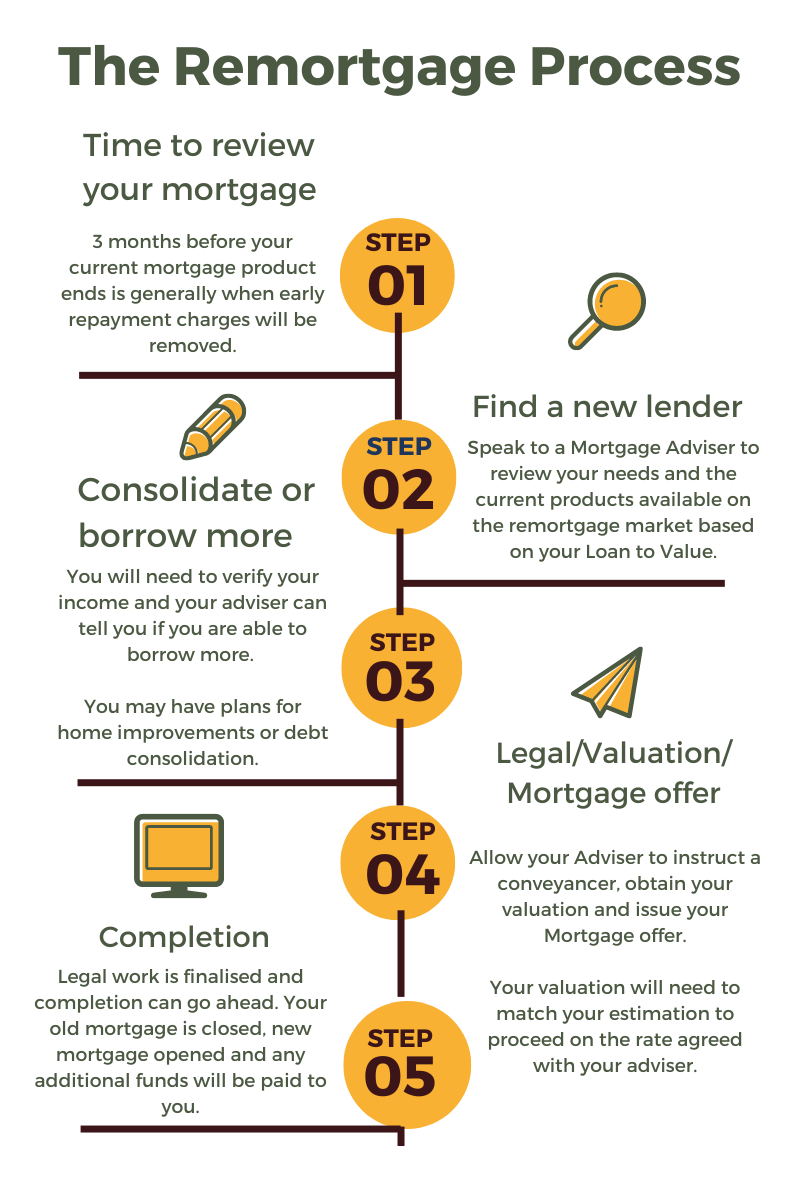
How Easy Is It To Switch Mortgage? Imagine a world where your new lender handles the paperwork, appoints a solicitor, and keeps you updated throughout the process. Well, that world exists when it comes to switching mortgages.
With the potential to save money and enjoy added convenience, discover how switching your mortgage can be a breeze. In just a couple of months, you could find yourself with a fresh start, thanks to a supportive mortgage adviser and a seamless transition to a new lender.
In this insight, we cover all you need to know about switching mortgages.
Switching mortgages is a straightforward process. Your new lender will handle most of the work, including appointing a solicitor and arranging a valuation. While it can take up to two months, your mortgage adviser will stay in touch, ensuring a smooth transition. You may even get some cashback.
A Mortgage Switch is also known as a Remortgage and is when a homeowner moves their mortgage from one provider to another. When switching, the homeowner may borrow extra funds, amend their terms, or repay their Mortgage.
Most people switch mortgage to take advantage of better interest rates available with other lenders. You can also switch to borrow more, or change the terms of your existing mortgage. You may decide to reduce the overall term and pay more.
For example if your current provider can only offer a 3% 2-year fixed rate. Another provider is offering 2% for the same term. You would save interest on your repayments by moving to a new lender via a mortgage switch.
You can complete a mortgage switch in around a 2-month timeframe. This will depend on how straightforward the case is and how quickly the conveyancing work will take. It is possible to switch in as little as 2 weeks. However, to do that, an electronic survey will be required. It is done to the lender to decide what survey to perform, based on your Loan to Value.

Ultimately, the time required to complete will be dependent on your solicitors.
If you have enough equity and pass affordability checks, you may be able to borrow more. When you complete on your mortgage, your solicitor will arrange a mortgage settlement amount to repay your old mortgage. The money left over after this will be paid to your bank account. You will need to declare your intention to borrow more to your lender. This is made more possible by switching Mortgage when house value has increased.
The funds can then be used for reasons such as:
if you borrow more on your mortgage, you may be spreading the cost over a longer term than a personal loan would. That could mean you pay more interest overall.
This also applies if you are consolidating debts. Although your outgoings might be less overall. You may pay more interest by the end of the term.
Some lenders prevent you from consolidating debts over a term longer than 10 years. Your Mortgage adviser will need to declare the reason why you are borrowing extra. This is to ensure they offer the correct advice.
Yes, you can switch at any time. However, you may face an ‘early repayment charge’ until at least 6 months before your current mortgage product expires. Each Mortgage will be different. You can find your early repayment charges in your Mortgage key facts document.
Seeking Mortgage advice is about what is important to you and your personal circumstances. When it comes to switching, a mortgage adviser will help you to understand what level of stability or flexibility you may need.
Once you and your adviser have established which mortgage product is right for you, they will be able to review their panel of lenders to see who has a Mortgage product that can meet your needs.
Mortgage terms vary from lender to lender, it may not always be a case of who has the cheapest product available.
For example, If you are going to be making overpayments, you may need a Mortgage product that allows for this which may not necessarily be the cheapest.
If you are considering switching mortgages you will need to have an idea as to how much your property is valued. The valuation figure that you provide to the lender will be used for assessing the application. The interest rates you are eligible for will be determined by your Loan-to-Value which is calculated using this provided value. However, once you proceed to the application stage, there will then be an official property valuation conducted. Some properties will have digital valuations, some will have a drive-by valuation.
There are factors that influence which type of valuation you will need, such as:
if you have a Loan to Value of less than 60% and are not too close to the bracket, your lender may determine your valuation based on statistics of local sales
If the lender thinks your valuation is not in line with sales from the local area and appears that you may have made a mistake then a standard valuation will be conducted. If your valuation comes back in line, you proceed with your application.
If your valuation falls short of what you have stated, then you may need to take a step back and re-review the products that are available now that the valuation figure has been confirmed.
If your valuation is quite a way off what you expected, it may move your Loan to Value to a different product LTV range. That means your interest rate might be higher. Your Mortgage adviser will explain how your valuation has impacted any products you were applying for.
The remortgage market is competitive and often there are incentives available for remortgaging to a new provider. One common incentive is free conveyancing for remortgages.
When it comes to switching mortgages, seeking advice from an expert is a good idea. A remortgage adviser can help you decide if it's the right choice for you. They can guide you in finding the best deals, comparing interest rates and fees from different lenders. They'll explain the potential savings and costs involved, so you can make a smart decision and get a better mortgage deal that fits your needs.
So, how easy is it to switch mortgages? It can be very easy, if you are organised and return the essential paperwork quickly, your mortgage adviser will take care of the rest. That includes surveys, issuing a mortgage offer, and arranging a solicitor.

Stuart is an expert in Property, Money, Banking & Finance, having worked in retail and investment banking for 10+ years before founding Sunny Avenue. Stuart has spent his career studying finance. He holds qualifications in financial studies, mortgage advice & practice, banking operations, dealing & financial markets, derivatives, securities & investments.
 No minimum
No minimum  Newcastle-under-Lyme, Staffordshire
Newcastle-under-Lyme, Staffordshire Free Consultations
Free Consultations
 No minimum
No minimum  Free Consultations
Free Consultations
 No minimum
No minimum  No obligation consultation
No obligation consultation
 No minimum
No minimum  No obligation consultation
No obligation consultation
 No minimum
No minimum  Free Consultations
Free Consultations
 No minimum
No minimum  No obligation consultation
No obligation consultation
 No minimum
No minimum  No obligation consultation
No obligation consultation
 No minimum
No minimum  Free Consultations
Free Consultations
 No minimum
No minimum  Coatbridge, Lanarkshire
Coatbridge, Lanarkshire Initial or Ongoing Consultation Fees
Initial or Ongoing Consultation Fees
 No minimum
No minimum  Initial or Ongoing Consultation Fees
Initial or Ongoing Consultation Fees
 £21,000 +
£21,000 +  Initial fee free consultation
Initial fee free consultation
 London, Greater London
London, Greater London No obligation consultation
No obligation consultation
 No minimum
No minimum  No obligation consultation
No obligation consultation
 No minimum
No minimum  Initial fee free consultation
Initial fee free consultation
 No minimum
No minimum  No obligation consultation
No obligation consultation
 No minimum
No minimum  No obligation consultation
No obligation consultation
 No minimum
No minimum  Initial fee free consultation
Initial fee free consultation
 No minimum
No minimum  Initial or Ongoing Consultation Fees
Initial or Ongoing Consultation Fees
 £51,000+
£51,000+  Free Consultations
Free Consultations
 No minimum
No minimum  No obligation consultation
No obligation consultation
 No minimum
No minimum  Initial fee free consultation
Initial fee free consultation
 £101,000+
£101,000+  Bishop's Stortford, Hertfordshire
Bishop's Stortford, Hertfordshire No obligation consultation
No obligation consultation
 No minimum
No minimum  Derry / Londonderry, County Derry / Londonderry
Derry / Londonderry, County Derry / Londonderry Free Consultations
Free Consultations
 No minimum
No minimum  Stockton-on-Tees, County Durham
Stockton-on-Tees, County Durham Free Consultations
Free Consultations
 No minimum
No minimum  Initial fee free consultation
Initial fee free consultation





Our website offers information about financial products such as investing, savings, equity release, mortgages, and insurance. None of the information on Sunny Avenue constitutes personal advice. Sunny Avenue does not offer any of these services directly and we only act as a directory service to connect you to the experts. If you require further information to proceed you will need to request advice, for example from the financial advisers listed. If you decide to invest, read the important investment notes provided first, decide how to proceed on your own basis, and remember that investments can go up and down in value, so you could get back less than you put in.
Think carefully before securing debts against your home. A mortgage is a loan secured on your home, which you could lose if you do not keep up your mortgage payments. Check that any mortgage will meet your needs if you want to move or sell your home or you want your family to inherit it. If you are in any doubt, seek independent advice.